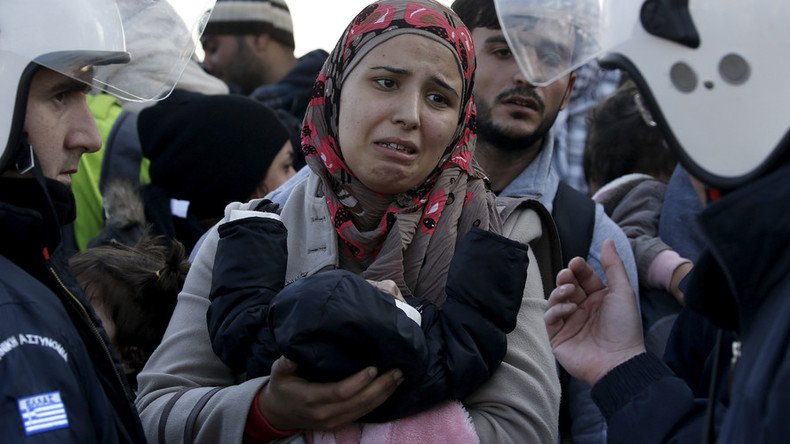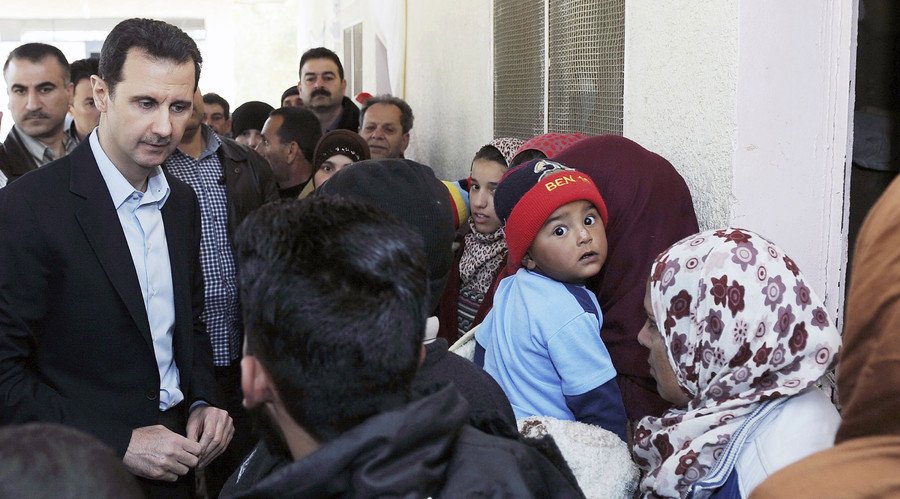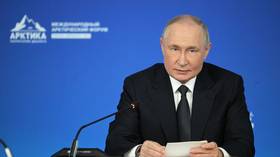This isn't about ISIS, just good old fashioned regime change

It must be difficult to be Syrian today. Not only are you seeing your country crumble before your very eyes and overrun by foreigners intent on imposing a system you never requested, but when you attempt to say what your aspirations are, you are ignored.
Syria is it seems everyone's problem, except the Syrians. They don't deserve a say in their nation's future.
Western capitals have decided that their president “must go”. Jihadi fighters have decided it should become the next Caliphate. Gulf monarchies and Israel are pushing for its destruction. But Syrians - well what Syrians want is irrelevant.
They can shout from the top of their lungs, their plight is pointless as their voices are muffled. Like that of a small child lost in a large crowd desperately attempting to be heard. Everyone looks down on him, sympathetically, and then looks away again to listen to the grown-ups.
As the conflict enters its fifth year, Syrian voices are once again muted. Opinion poll after opinion poll clearly indicates that a majority of Syrians, living in Syria, would prefer Bashar Al Assad to remain as their leader.
Assad is naturally popular among his own Alawite community, but he is also popular among other minorities who've enjoyed peace and prosperity under his rule.
Among the Sunni majority of the population is where support is perhaps less obvious. Some have remained loyal supporters while others who opposed him in the early days of the uprisings have decided that he is by far the better alternative in light of the nature of the regime his opponents would like to implement.
When added up, this gives the Syrian president a comfortable majority should further elections be held.
Nevertheless, what Syrian public opinion wants never features in debates about the Levantine country.
Last week, Britain's parliament was momentarily shaken by the prospect of a round of voting that, had it not passed, would have almost certainly forced Prime Minister David Cameron to resign.
As it happens, the motion he supported was voted in by a comfortable majority of his MPs as well as several from other parties.
The motion was essentially focused on whether air strikes should be extended to Syria. David Cameron, who'd accused Russian President Vladimir Putin of exacerbating the risk of radicalization among disenfranchised Muslim youths through his air strikes, was pushing for further strikes himself. Unlike Putin however, Cameron dispensed with superfluous details such as getting approval from the sovereign state of Syria.
A week into British involvement, in collaboration with France and the US, another 'blunder' has taken place on the battle fields. Instead of targeting ISIS outposts, the US hit a Syrian army base killing at least three soldiers and wounding scores of others, according to Syrian officials.
The Syrian army which is at the forefront of the battle against the terror outfit now has to protect itself from ISIS and US fire. One would think they were working in tandem!
This of course is not the first time, the US, credited with the most sophisticated military hardware, has made mistakes by hitting ISIS opponents instead of terrorists. Better still, at times weapons and food supplies were also dropped in ISIS zones, unintentionally, according to US sources.
Over ten years ago, when the US was about to invade Iraq, in what proved to become the birthplace of ISIS, experts spoke of satellite technology that allowed astronauts to read a newspaper headline from space!
And yet in the 14 years that the US has waged its war 'on' terror, civilians in Afghanistan and Yemen have 'mistakenly' died by the hundreds, at the hands of US drone operators, to the delight of Al-Qaeda which saw its ranks inflated thanks to the frustrations caused by these indiscriminate attacks.
So what to make of operations designed to destroy or at the very least weaken an organization that is made up of unprofessional thugs, recruited through the internet and hoping to live out some adventure through the cover of a ‘cause.' Surely they should be no match for a powerful coalition of the most well equipped armies in the world.
Could it be that the aim of the coalition is not to destroy ISIS but rather to remove Assad?

‘Assad must go’ - a four year old mantra
As soon as protests started in Syria, the mantra echoed across Western capitals was that Assad must go. When that wish failed to materialize it turned into statements of fact: “Assad will go” to “Assad will be gone by the end of the week/month/year.”
Over four years on and Assad is still in place in his capital Damascus commanding more support than he did then.
His international standing was strengthened when Vladimir Putin invited him to Moscow indicating he was the only legitimate voice of Syria on the global stage.
Such defiance proved difficult to bear for Washington et al who'd banked on his rapid demise and who were now faced with quantities of egg on their imperialist faces.
Surely if the West wants a leader to go, he has no business remaining in his post regardless what his people think.
And so to the most recent airstrikes, given a veneer of respectability, by a dubious UN mandate that gives free reign to all to deal with the “ISIS threat”.
Needless to add that it was the same UN that approved resolution 1973 against Libya and which remained idle as that mandate was violated from day one. Paving the way for disastrous regime-change that plunged Libya into predictable chaos.
The motion put forward by the British government last week, has an equally dubious clause. It states that “Military action against ISIL is only one component of a broader strategy to bring peace and stability to Syria,” implying therefore that other means will be used.
A clear indication that the motion, initially approved to tackle ISIS, will be re-focused on what Britain wants for Syria i.e.: a new president.
After the catastrophe of Iraq, many assumed the same mistakes could not be repeated. And yet intervention in Libya with all it entailed was approved in under three weeks leading to an almost identical scenario.
The idea that lessons are learnt is obviously a myth. When bombs and chaos affect far-away lands and people it's easy to dismiss their effect.
Bombing people 'into democracy' has been a long held belief among nations responsible for the worst wars of the last century and beyond.
Claiming that the ungrateful recipients of such benevolent explosives should be thankful for the values imposed on them.
And so as Syrians living in Syria continue to voice their support for their president it seems 'peace and stability' will have to be decided from Westminster, Washington or even Paris. Either way Damascus won't have a say.
The statements, views and opinions expressed in this column are solely those of the author and do not necessarily represent those of RT.














